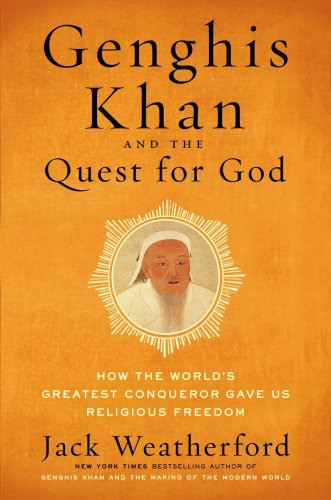
Genghis Khan and the Quest for God
How the World's Greatest Conqueror Gave Us Religious Freedom
کتاب های مرتبط
- اطلاعات
- نقد و بررسی
- دیدگاه کاربران
نقد و بررسی

August 8, 2016
Weatherford (Genghis Khan and the Making of the Modern World), former professor of anthropology at Macalester College in St. Paul, Minn., focuses on the religious life of Genghis Khan (1162–1227), repeating some biographical material from his earlier book. Weatherford is an engaging storyteller who has done broad research and is passionate about Khan and his impact, but this passion is the source of the book’s major weaknesses. First, Weatherford frequently presents unsupported speculation about Khan’s personal psychology as knowable facts, perhaps to make history accessible for a popular readership. Second, in rehabilitating Khan’s reputation as a bloodthirsty conqueror, Weatherford often misbalances and overstates his own theses, portraying Khan instead as a model of ideal justice and wisdom and the potential origin of modern religious freedom. Third, Weatherford meanders, touching on, for instance, Khan’s own spiritual life; the laws and taxes for adherents of various religions in his empire; and a review of connections between Mongolia and Tibet. This is an interesting overview of some of the religious dynamics of the Mongolian empire in the 13th century but will leave readers looking for in-depth analysis wanting. Agent: Robin Straus, Robin Straus Agency

Even history's most famous conqueror had a soft side.An acclaimed expert on Mongolia, Weatherford (The Secret History of the Mongol Queens: How the Daughters of Genghis Khan Rescued His Empire, 2010, etc.) introduces readers to a Genghis Khan (c. 1162-1227) not discussed in most history books. Though he was unquestionably a ruthless and violent conqueror, the author wants readers to see his subject as a thoughtful leader marked by extraordinary forethought and wisdom, paired with a religious personality. Among Weatherford's most startling revelations is that, centuries before John Locke and similar thinkers, Genghis Khan believed in and promoted religious tolerance within his great empire. Early in the book, the author does an admirable job explaining the physically harsh and brutal life into which Temujin--the name of the future Khan--was born and raised. Readers may grow to feel empathy for the young and unlikely future ruler, until fratricide and other acts of violence quickly taint his image. Founding the nation of Mongolia in 1206 with 1 million followers, Genghis Khan showed early wisdom in deciding to bring the written word to his empire, and he set about having scribes put the Mongolian spoken language into writing. Military success led to vastly increased landholding, and his empire grew. Weatherford details his conquest of China and then of Muslim lands to the west. Throughout, Genghis Khan considered himself "the whip of heaven," chosen to bring order and justice to a troubled world. This included a solemn religious duty: "As heaven's representative on earth, he felt it was his duty to examine the religions of the people he had conquered to determine what they were doing incorrectly and to correct their errors." As he aged, however, Genghis Khan transformed from judge to student, as he spent more time learning about the religions of his conquered lands and incorporating their finest points into his administration and lawmaking. An intriguing, eye-opening spiritual biography. COPYRIGHT(1) Kirkus Reviews, ALL RIGHTS RESERVED.

May 15, 2016
A former anthropology professor who divides his time between the United States and Mongolia, Weatherford is the "New York Times" best-selling author of "Genghis Khan and the Making of the Modern World" and "The Secret History of the Mongol Queens", recently optioned by Weinstein for a multipart TV series. Here he explains how Genghis Khan determined that maintaining an empire meant giving his subjects freedom of religion.
Copyright 2016 Library Journal, LLC Used with permission.

























دیدگاه کاربران